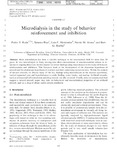| dc.rights.license | http://creativecommons.org/licenses/by-nc-sa/3.0/ve/ | |
| dc.contributor.author | Rada R., Pedro Vicente | |
| dc.contributor.author | Páez, Ximena | |
| dc.contributor.author | Hernández R., Luis F. | |
| dc.contributor.author | Avena, Nicole M. | |
| dc.contributor.author | Hoebel, Bartley G. | |
| dc.date.accessioned | 2015-02-05T15:32:40Z | |
| dc.date.available | 2015-02-05T15:32:40Z | |
| dc.date.issued | 2007 | |
| dc.identifier.uri | http://www.saber.ula.ve/handle/123456789/39730 | |
| dc.description | Artículo publicado en: B.H.C. Westerink and T.I.F.H. Cremers (Eds.) Handbook of Microdialysis, Vol. 16. ISBN 0-444-52276-X
Copyright 2007 Elsevier B.V. All rights reserved | es_VE |
| dc.description.abstract | Brain microdialysis has been a valuable technique in the neuroscience field for more than 20
years. In vivo microdialysis in freely moving rats allows measurement of neurotransmitter release in response
to ongoing behaviors. In this chapter we review findings using microdialysis in the study of behavior
reinforcement and inhibition. This literature leads to the development of the dopamine hypothesis of
reward and the cholinergic hypothesis of aversion and their underlying neural circuitry. Within the context
of natural rewards, we discuss many of the key findings using microdialysis in the nucleus accumbens,
ventral tegmental area and hypothalamus to study feeding, water intake, and mating. Artificial rewards,
such as intracranial self-stimulation and drug reward, are also reviewed. Finally, data are summarized that
suggest a natural reward, sugar, may take on behavioral and neurochemical properties of an artificial
reward, such as a drug of abuse, under certain conditions | es_VE |
| dc.language.iso | en | es_VE |
| dc.rights | info:eu-repo/semantics/openAccess | |
| dc.title | Microdialysis in the study of behavior reinforcement and inhibition | es_VE |
| dc.type | info:eu-repo/semantics/article | |
| dc.description.colacion | 353-378 | es_VE |
| dc.description.email | radap@ula.ve | es_VE |
| dc.description.email | pacap@ula.ve | es_VE |
| dc.description.email | hernande@ula.ve | es_VE |
| dc.description.email | hoebel@princeton.edu | |
| dc.publisher.pais | Venezuela | es_VE |
| dc.subject.facultad | Facultad de Medicina | es_VE |
| dc.subject.institucion | Universidad de Los Andes | es_VE |
| dc.subject.thematiccategory | Medicina y Salud | es_VE |
| dc.subject.tipo | Artículos | es_VE |
| dc.subject.unidadinv | Laboratorio de Fisiología de la Conducta | es_VE |
| dc.type.media | Texto | es_VE |


